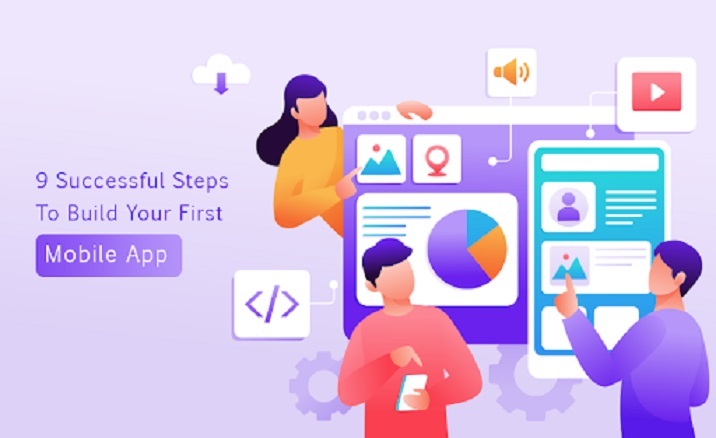So, you are planning to have an app to make a presence in the market by target a large audience. Well, it’s a good approach, but first, you must understand your basic requirements and the concept of your app. There are various mobile app development services available in the market. You can avail of the services from the best companies that better fits your budget and requirement.
In this highly competitive market of mobile applications, people are earning huge revenues through making customized applications. Not every developed app gets successful in the market, most of the apps failed to convince people that they are useful. If this is your first app development attempt, go through this detailed post.
In this post, I will discuss all the necessary details and steps of building a successful app.
Mobile App Development Process
1. Set Your Goals and Objectives
This is a crucial stage of mobile app development, as you must set an objective or purpose for developing an app. If you already have a plan, or an idea discussed, then this stage would not be so difficult for you. Each app available in the market resolves some issues that people usually face in their daily life. Your app should be capable to tackle those issues. Make an exhaustive list, and then think about how you can resolve those issues from an app. Few factors are there that has to be considered while planning for the app-
- Purpose of developing an app
- What problems my app will solve
- What features it will include solving issues
- The targeted audience
- Competitors available in the market, which are resolving the same issue
- How my app would be different from others
2. Planning and Research
This step is all about converting your app ideas into reality by discussing various factors. At this stage, you discuss the blue sketch of your app and decides its layout and structure. Having a rough sketch helps your team to understand the concept of the app and its purpose. In-depth market research makes you understand various segments and factors, necessary for the mobile app development process. Proper research and planning include-
- Deep market research
- Selecting the best option and purpose of your app
- Calculation of the budget
The Time frame of completing the project
This is the smartest way to get a rough idea about the similar apps available in the market. How you can differentiate yourself from others is decided at this stage.
3. Analysis of Competitors
By doing a deep analysis of your competitor, you can analyze your success ratio. If you Google about the trend of application development, it will show you the results of all the successful apps, and how it had gained success will also be shown. Having a deep-down knowledge about competitors-
- Helps you in determining the success ratio of your app in your niche.
- Helps you in finding the potential customers that will be your targeted audience.
- Help you in examining your competitor’s app ideas and the features, which must include to enhance customer experience. Through this, you can think to implement certain ideas, that will make you different from your competitors.
4. App Platform
Deciding on the platform of launching the app matters a lot. There are 3.48 apps are available on the Google play store and 2.22 million apps are present on the Apple store. Android and IOS are the only two biggest platforms on which you can get people’s attention. Among all these apps, only a few are famous and are used worldwide. With this data, you can get an idea of how big your competition is going to be. Find out the reason, why the app faces failure in the market and try not to repeat the same mistake. Developing an application for both IOS and Android platforms would be beneficial because it will increase your user reach and help you in increasing your revenues if all goes well.
5. Layout and UI/UX Design
Preparing app layout means, that you are converting your app features and functions into a clear picture. The purpose of planning an effective app design is to deliver a seamless experience to users. UI/UX plays a vital role in app development because it is like a “first impression of yours” which should be the best. The success of your app design is based on how well your users are adopting your app features. UI refers to how your app represents itself among users, and UX means how users are giving commands to your application and how fast the app is responding to them. If they find your app user-friendly, it means they will use it in the future, and that would be your success. While planning for application development, your aim should be to make it intuitive, interactive, and user-friendly.
6. Prototype / Wireframe Designs
This is the time when your idea becomes visible among your people. Creating wireframes is a fast and cost-friendly approach to designing app layouts. It’s better to consider device-specific designs while deciding on wireframes. Here You decide all the essentials of your apps relates to its prototype and wireframes like-
- Visually presenting your app to your team
- Explaining its functions and features
- Discussing its basic features
- Showing its inner navigation
Wireframes are the overviews of your app ideas. Instead of sharing your vies through pen papers to developers, you can use various software that allows you to turn your paper ideas into interactive animations. It helps in efficiently sharing the wireframe ideas with app development companies. It is important to use online tools for the app development process, rather than just depend on rough paperwork.
7. Decide Application Workflow
This is the organizing stage of your app development. When you passed the wireframes and prototypes stage of your mobile app development, now it’s time to decide the process. Without properly deciding the app development stages, you cannot start the development process of your app. Workflow applications are used in handling the managing team, assigned different tasks. It is also used in making necessary changes in the app, identified while discussions. Below mentioned factors are beneficial if you have a dedicated application workflow that manages all the tasks-
- With proper automated workflow, you can save your company’s overall cost. Apart from this, you can simply set expense priority, budget approval and can minimize unnecessary spending.
- You can easily manage your resources allotted to specific tasks. The ability to manage and control the stages of the mobile application development process helps you in eliminating unnecessary resources, respond quickly to emergencies, and shift the money flow to more required departments.
- It gets necessary to do certain marketing campaigns to aware people of your applications. Marketing strategies are important at the initial stage. Well-organized application workflow gives you leverage to set conduct a deep study on the generated results like customer real-time feedback, expectations, and preferences, it helps in grabbing people’s attention towards the app. To run better crowdfunding marketing campaigns, it is mandatory to have a well-managed application workflow.
8. App Development
Before starting the programming, you must-
- Decide the technology stack
- Technical architect that would be considered
- Define the development timeframe
This step includes three crucial aspects which are APIs, back end/server technology, and Mobile app front end. These integral parts decide the functioning of the app on the platform, which matters a lot.
9. Testing
At the final stage you test your app functions and features before launching it in the market. To ensure the stability, usability, and security of the app it is necessary to pass the criteria of quality assurance. Prepare address cases and try to improve those before lunch. There are some testing criteria that play a vital role in the application development process-
- User experience testing is conducting to ensure that it perfectly matches the user requirements. It should meet the original design guidelines set by the team.
- Functional testing helps in ensuring the efficient functioning of the app. Before deciding the final layout and structure of the app, it is essential to check the bugs if any occur in the app.
- Performance testing and security testing are the final tests that you have to do before pre-launch. You must convince your users that their data is secure, and they can trust you. No performance issue should arise in the app so don’t forget to check the app screen loading time, how much battery the app is consuming, network bandwidth, and the size of your app.
Conclusion
Owning an application means high revenues, customer support, popularity, and a high brand image. The mobile app development services can convert your vision into reality, you just have to plan things according to your budget.
If you are looking to build your first app and need proper guidance and assistance, hire a reputed mobile app development company with years of experience that provide top-notch app development services.





